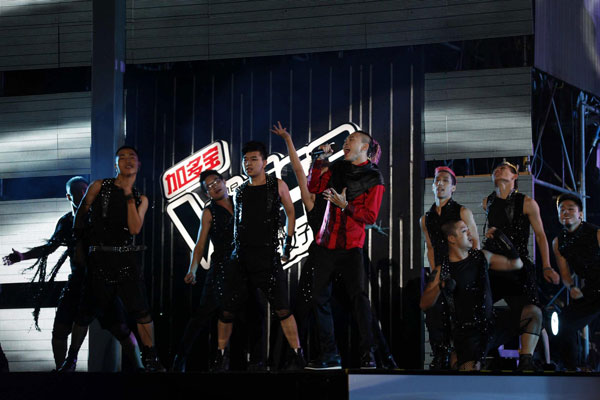THE HAGUE - The Voice, a singing competition television series started in the Netherlands, has been adapted by many countries and regions into their own versions and is creating a sensation worldwide.
Created by John de Mol, the owner of production company Talpa, the reality talent show consists of a blind audition, a battle phase, and live performance shows.
 |
|
Zhang Wei (C), a contestant, sings during the final round of the television show "The Voice of China" in Shanghai September 30, 2012. [Photo/Agencies] |
Launched in 2010, it notched up an incredible success in the Netherlands. The format has been sold to a number of countries and regions, including China where its own version of the show kicked off in July 2012.
Besides The Voice, Dating in the Dark and I Love My Country are also among the Netherlands' numerous TV formats that are broadcast all around the world. To the surprise of many, the small European country is among the five top distributors for TV formats in the world.
"In the Netherlands, we have a very competitive TV landscape. We are used to making a lot of TV formats to comply with the market demand," Maarten Meijs, managing director of Talpa Distribution, told Xinhua.
This is how it works: The Voice comes with a "format bible," which records every detail of the original TV program, such as lighting, theatrical design, stage setting and even standards for choosing the contestants.
The Voice has become a brand and television companies that want to produce it must pay a license fee to use the intellectual property.
"The success of the Voice worldwide can be explained by the positive energy that the show sends out. The coaches, the blind auditions and the fact that audience can play along add to this positivity," Meijs said.
"Most of these Talpa-produced formats are low budget productions," noted Christoph Lindner, professor of media and culture at the University of Amsterdam.
"This is due to the fact that television stations around the world have so much time to fill. So reality shows such as The Voice help to fill up their schedules," he said.
As Meijs sees it, the content is also an important factor behind the popularity of the show.
"In this globalized world, there is this tendency of people to revalue their own culture and roots. People like to celebrate their origins. And this is reflected in the TV Format I Love My Country," Meijs said.
It is fair to say The Voice is successful in another aspect: it earns a lot of money through advertising and televoting.
At a time when the consumers have their own ways to skip advertising, by recording programs or watching television on demand, advertisers are looking for new ways to incorporate publicity within shows. The Voice provides them with an opportunity.
An important element of the talent show is the color red. In the Netherlands, this element subtly refers to the main sponsor of the show: Vodafone, while in China, the color reminds the audience of the local main sponsor Jiaduobao drink.
To draw the attention of Chinese consumers, some other sponsors make use of product placement or explicitly place logos on the screen. In Britain, a sponsoring telecommunication company saw a lot of potential of using digital media around the show.
The success of the TV shows can also be seen in a negative way, Lindner said.
"It is true that TV shows such as The Voice can bind communities and even nations together. But this element of nationalism, which you can see particularly in the show I Love My Country, is reductive. These shows do not stress the variety and diversity of a culture. They stress homogeneity, and they encourage an inward look," he said.
Although the shows give people who live in obscurity an opportunity to become famous, Lindner said, "These talent shows stimulate celebrity mania. And that becomes problematic when people start to think that they can become famous without working for it."
